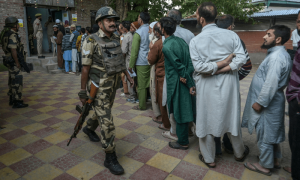SARAJEVO: Slobodan Milosevic, who goes on trial next week at the UN war crimes tribunal, was once treated by the West as a peacemaker rather than a warmonger.
The Dayton treaty to end the Bosnian war is a legacy of those days. And more than six years after it was signed at a US air force base in Ohio, there is general agreement among the country’s international peace overseers that Dayton is not enough to create a viable Bosnia.
Diplomats acknowledge that Dayton was largely a carve-up along the lines of the trenches at the end of the war which gave too much power to two highly autonomous regions and not enough to the central government to create a functional modern state.
But they do not favour periodic calls from some politicians and analysts to convene a new peace conference and draw up a “Dayton Two”. Instead, they are encouraging Bosnians to see Dayton as a starting point, not an end goal.
Their mantra is that Bosnia’s people should take the lead in reforming their country. Closer ties to the European Union — including eventual membership — are being dangled as a reward.
“In the end, Bosnia should not be a Dayton country. It should be a European country,” Wolfgang Petritsch, the Austrian diplomat who is the international community’s High Representative in Bosnia, told Reuters in an interview.
DEAL REFLECTED WAR: With Serbia’s then-president Milosevic negotiating for the Bosnian Serbs, the US-brokered peace deal agreed at Dayton in November 1995, ended more than three years of fighting which had killed around a quarter of a million peoples. Each entity has its own army, its own television stations, its own mobile phone network, its own direct sources of revenue.
The central state has none.
Initial attempts to create even the limited features of a single state which Dayton provided — such as passports, a common vehicle licence plate and a common currency — were hampered by disputes between the different ethnic groups.
Only two years after Dayton did the international community give its High Representative in Bosnia more clout to impose decisions and sack obstructionist local officials.
“We are about where we should have been in 1998,” one senior international official said of the peace implementation efforts.— Reuters














































Dear visitor, the comments section is undergoing an overhaul and will return soon.